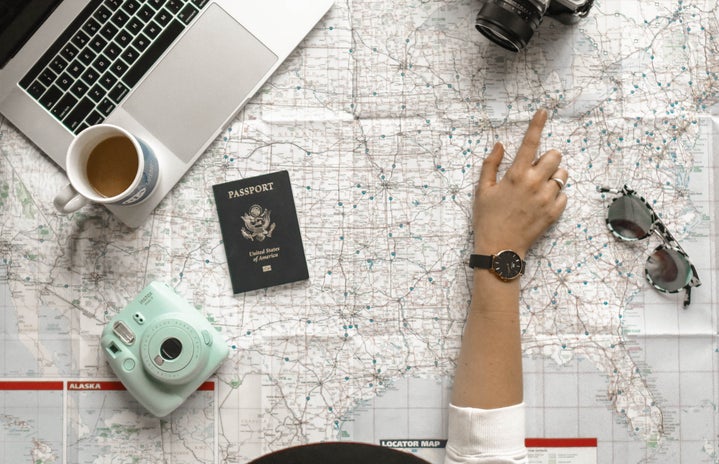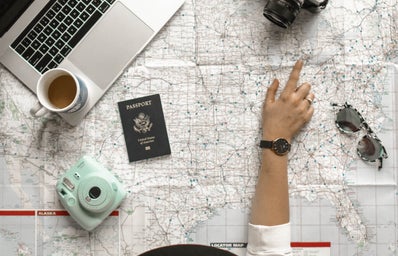Disclaimer: Minor edits have been made to the interview for grammar and spelling. The only spelling errors that have been left untouched are anything written in British English. The interviewee will be kept anonymous.
I went to study abroad during the summer. Specifically, I went to Scotland. For a month, I took summer courses while exploring a new country. It was a blast! I had never been outside of the country before studying abroad, but by the end of the trip, it made me feel braver about traveling in the future.
I will be honest and say that I did not make too many friends while I was abroad. That is the issue with going on a short summer program sometimes. You have a lot of classwork to catch up on. However, I did get to meet a friend who I have known for a while through another friend. He’s from Scotland, so I got to meet him with my friend, and we got to spend a weekend exploring a town together.
Before we went abroad, we had to take a prep class because there are certain things you should know before you go on a trip. It was the minuscule things that mattered the most when we went abroad. How do you be a respectful traveler? How should you act around people of different backgrounds? We are all going to make some assumptions beforehand, but if we want to enjoy our time, we have to move away from stereotypes. So, I enlisted my Scottish friend to talk about his thoughts regarding the visitors that come into Scotland because it helps us to see it from a different perspective.
- Tell me about you and your cultural background.
-
I am Scottish. I was born into a Protestant family and had a normal public education. I see Scottish people as very in touch with their land and history—most family’s having some, even if very little, experience in agriculture/farming. And events held annually like the highland shows and games where people gather to show specific things to the Scottish culture, from log throwing, smoked salmon, haggis, shortbread, forging, dancing, and of course, bagpipe music. Although, there are some downsides in the culture as well, like fights starting over football mixed in with religion. It is one of the biggest and most violent rivalries in football. Widespread poverty and people living on a low income, and the problems that come along with that. Some things outsiders may not see in Scotland is that we are a very developed country in terms of equality, from free sanitary products for women, and evolved gay and trans rights, the most recent being a gender reform where the government recognises sex changes.
Another unique thing we have is the right to roam. It is an old custom that allows us to wander in the open countryside, either it be public or private land. On the outside, Scots seem aggressive, but we can be very welcoming and kind. We may curse a lot though, and if someone calls you a name, it is usually seen as a term of endearment unless they are visibly angry. We have a good sense of humour that way.
*football means soccer in this context
- What qualities do you think makes a respectful visitor to another country?
-
Open-mindedness, kindness, and willing to learn. Treat those how you would like to be treated. That goes for anywhere. But also, being mindful of cultural and language barriers.
- What are your perceptions of people who study abroad?
-
My perception of people that study abroad is that I view it as a good way of educating about culture and other countries, but also one that can be restricted to people of higher class or [who] make more money, as in the U.K. School trips abroad are very uncommon. The closest thing I can think of is Outward Bounds, which is a program for outdoor activities usually taking place in the highlands that lasts two weeks.
- Can you usually tell if someone is not from the area based on how they act? If so, what observations have you made?
-
Very much so, sometimes even down to how they dress, as Scotland and the U.K., in general, wear a lot of similar clothing and brands. As for how they act, Americans can typically be seen as loud and very touristy, and it is quite easy to spot someone who is lost trying to find their way on our iconic roads/streets or [who] doesn’t quite know how our public transportation works.
- What is something you wish people who are visiting your country knew?
-
How big the language barrier really is. A lot of foreign countries mispronounce our cities and can barely understand our many accents, which can change with as little as a 10-minute drive. Another is how cold it can get even during the summer if you are used to warmer climates. And don’t be scared of our food! The ingredients may sound gross, but it tastes good.
- Have you ever traveled outside of your home country? If so, what did you learn when you traveled?
-
I’ve only taken the short trip down to the north of England, but I still learned a lot on those trips. Not all tap water is safe to drink or tastes good. The accent shock, although northern England accents are quite similar to Scottish ones. It still took some time to get used to it. And that day-to-day life can get expensive from parking and more expensive shops that Scotland only sees in the centres of its big cities.
- Regardless of your answer to the previous question, what advice would you give others when traveling abroad?
-
Advice I would give is to do a lot of pre-planning and research. If there’s a language gap, learn some of the basics of the language, and overall be open-minded about the culture and be willing to try new things.
This is only one person’s perspective, and as they say, a lot of research is necessary when visiting a different country. There is different etiquette to consider. For instance, sometimes, learning a new language does not hurt. When you study abroad, be specific about your research. Learn about what they find to be respectful and disrespectful in terms of manners. I know this might seem overwhelming to hear, especially if you plan to study abroad. However, it is fulfilling, and from experience, you really do learn so much about yourself.


